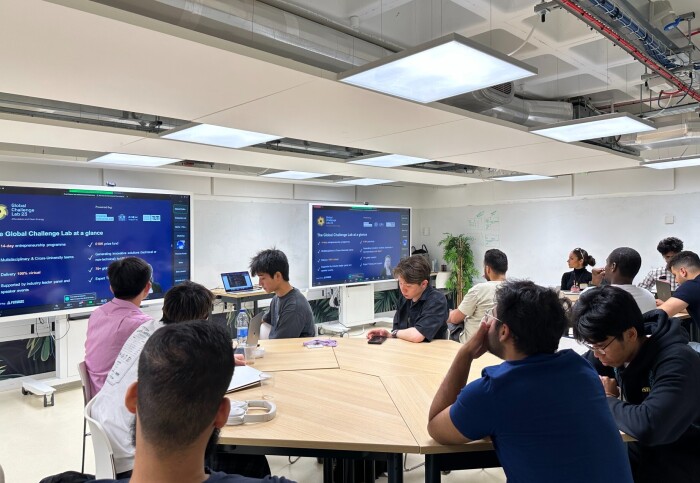Students assemble to share solutions to tackle global energy problem

Students worldwide have assembled to tackle the global energy problem and work towards achieving the goal of affordable and clean energy for all.
Imperial Enterprise Lab has joined forces with Tsinghua University Beijing, and the Technical University of Munich, to bring together more than 1,200 students from across a further 22 international institutions for the 2023 Global Challenge Lab.
The programme is a two-week virtual hackathon, supported by Futurize, where students and recent alumni get the opportunity to develop their entrepreneurial skills while collaborating across cultures, disciplines, and institutions to generate actionable ideas that can make a real impact in the world.
This year’s programme focused on finding solutions that improved access to ‘Affordable and Clean Energy’ - the United Nation’s 7th Sustainable Development Goal. Access to energy is vital for economic development and improved quality of life, yet a disproportionate amount of the world’s population still lacks reliable, affordable, and sustainable energy sources. Given the increasing severity of the global energy crisis and climate change, solving this challenge is more important than ever.
Projects targeted key areas such as Renewable Fuels, Energy Efficiency, and Infrastructure Optimisation. Selected teams were given the opportunity to pitch their ideas at the end for a chance to win a share of the £10,000 prize fund.
The 2023 winners are:
GreenPower
A technology designed by students from Imperial and The New School that harnesses anaerobic digestion to convert biogas from food waste into clean energy. This project is a perfect example of the kind of circular models we need for realising a sustainable future.
Solaris
Students from Imperial, University of Toronto, University of Sao Paulo, and Indian Institute of Technology Madras teamed up to produce a model that employs machine learning to optimise heating, ventilation, and air conditioning systems inside commercial buildings, achieving smarter, greener workplaces.
GreenEnergix: SlimeWorks
This collaborative effort by Hanoi University of Science and Technology, University of Toronto, University of Sao Paulo, and UnternehmerTUM students draws on slime mould’s ability to form the shortest networks to facilitate affordable and reliable access to electricity. Beginning with Ethiopia, this software solution aims to coordinate electricity infrastructure development by mapping and predicting demand, optimising networks, and monitoring consumption.
--
The Global Challenge Lab is just one of Imperial’s many initiatives promoting international collaboration. Recent examples of how the College promotes working across borders include: Imperial’s visit to Japan aimed at forging a strategic partnership with the University of Tokyo, and a showcase in the US of some of Imperial’s most innovative tech startups.
Last year’s Global Challenge Lab saw students develop technology-driven solutions to combat climate change (UN Sustainable Development Goal 13), with projects focusing on key areas such as Renewable Energies, Sustainable Agriculture, Natural Hazards, and Urban Innovation.
The 2022 winners were SolarCred (a project that gives households access to portions of digital panels on solar plants hosted upon rented rooftops), E-Parali (a scheme to help Indian farmers substitute out burning methods of post-harvest field clearing which exacerbate air pollution), and Imperfectly Delicious (a project that reduces food waste by utilising less aesthetically appealing produce).
To get involved in next year’s Global Challenge Lab as a participant, mentor or supporter, please contact the Imperial Enterprise Lab.
Article text (excluding photos or graphics) © Imperial College London.
Photos and graphics subject to third party copyright used with permission or © Imperial College London.
Reporter
Sachin Sreejith
Communications Division
